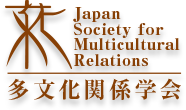多文化関係学会 関東地区研究会
日時:2015年5月23日(土)May 23 (Sat), 2015
会場:青山学院大学 (青山キャンパス)青山学院大学15号館(別名ガウチャーホール)5階13会議室
ガウチャーホールは1階がチャペルになっており、15号館への入口はチャペルを通りすぎた横の奥手にあります。
(Aoyama Gakuin University Aoyama campus, Bldg.15, Meeting room #13)
タイトル:「会話分析から異文化間コミュニケーションを考える」(Conversation Analysis and its insights on Intercultural Communication)
話題提供者:武田 礼子(TAKEDA, Reiko)
スケジュール:
13:15-15:30
参加費:無料 (Program Fee: Free) 茶話会参加のみ500円の茶菓代をご協力下さ
い (Informal Tea Party: 500 yen)。
*研究会終了後、15:30~16:00は、臨時総会(予算関係)が行われます。その後、
16:00から、会場にて話題提供者を囲んでお話ができるよう簡単な茶話会を予定
しております。
申込方法: 下記のURLの参加申し込みフォームに必要事項を入力し、、5月18日までに、お申込みください。
研究会参加申し込みフォーム https://survey.zohopublic.com/zs/HGCKPF
その他問い合わせは、担当者 岡部大祐
(Daisuke Okabe) daisuke.okabe[AT]zoho.com までご連絡ください。→[AT]を@に変換してください。
————————————
【ワークショップ講師氏名】
武田 礼子 (TAKEDA, Reiko)
【プロフィール】
青山学院大学非常勤講師(担当:英語)。これまで米国(カリフォルニア州)現地校でバイリンガル教員(スペイン語)、日本で外資系企業の社内通訳およびフリーランス通訳の経験を通じて、会話や相互交流に興味を持つ。
現在、国際基督教大学大学院 博士後期課程在籍中(アーツサイエンス研究科言語教育専攻)。会話分析や教室談話分析を通して、言語教育を研究。
Reiko Takeda is currently teaching English at Aoyama Gakuin University. Through her professional experience as a former Spanish bilingual classroom teacher in California, USA, as well as in-house and free-lance interpreting, Reiko became interested in people, what they say and how they interact.
Currently, Reiko is a doctoral student at International Christian University, where she studies conversation and classroom discourse and its applications to language education.
【タイトル】
「会話分析から異文化間コミュニケーションを考える」(Conversation Analysis and its insights on Intercultural Communication)
【概要】
「会話分析…聞いたことはあるが、何のことだろう?」という疑問や「会話分析の記号は見たことはあるが、面倒臭そう…」という懸念を持った経験はないだろうか?このワークショップでは、はじめに会話分析の基本概念およびその英語教育での応用を紹介する。また、参加者には実際の初歩的な会話分析に取り組んでもらう。あるテレビ番組のトークショー(日本語)で繰り広げられる司会者とゲストの会話を聞き、その逐語録に会話分析で使われる記号を入れることによって、会話のみならず、それ以外の会話的行為が浮き彫りとなることに対し理解を深めていく。
“I’ve heard of Conversation Analysis, but I wonder what it’s about?”
“I’ve seen the CA symbols, but putting them in a transcription looks like so much work.”
These are some of the issues, which have been heard about Conversation Analysis (CA). This session will explain the basics of CA and how it has been used in English language education. In the workshop, participants will experiment with CA, using data from a Japanese television talk show. By inserting CA symbols, participants will gain an understanding of conversational features, which emerge in the interaction.

